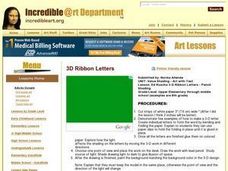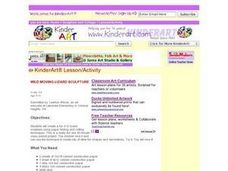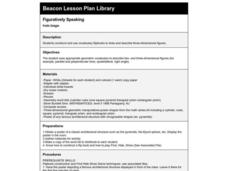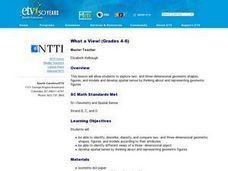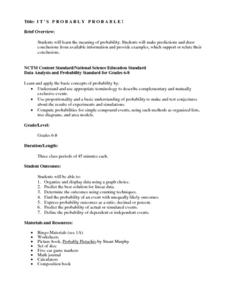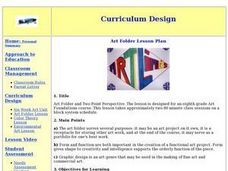Curated OER
Creating 3-D Shapes in Art
By learning techniques for drawing 3-D shapes, students can create realistic drawings.
Teach Engineering
Seeing All Sides: Orthographic Drawing
How can your draw three-dimensional figures on paper? The lesson shows pupils how to draw orthographic projections of three-dimensional figures composed of cubes. After viewing a PowerPoint presentation, they practice this skill with...
Curated OER
3-D Ribbon Letters - Pencil Shading
Learners examine the art of Edward Ruscha and make a three-dimensional model of a single word. They explore shading and value, and create a drawing of the model. They render ribbon strip letters in varied values to show 3-D quality.
Curated OER
Shaded Bottles
Learners draw, and then paint three-dimensional bottles to practice shading which shows shape and perspective. The step-by-step process for creating dimensional still life art is outlined, which makes teaching art an attainable task. Oil...
Curated OER
Contour Drawing
Students create a contour drawing of a hand creating an illusion of depth. After a brief demonstration of contour drawing, students practice by creating pictures of various objects. The final project consists of creating a contour...
Curated OER
Rainforest 3-D Art
Third graders create a three dimensional Rainforest scene which shows five aspects of the rainforest. They orally present the scene.
Teach Engineering
Let's Take a Spin: One-Axis Rotation
Investigate the effect of one-axis rotations on geometric figures. Scholars learn to use snap cubes and the right-hand rule to draw figures after rotations about the x-, y-, or z-axes. They try their hands at examples created by the...
Knoxville Art Museum
Lee Walton: Codes in Drawings
Familiar with the systems-based sports drawing of experimental artist Lee Walton? If so, this drawing exercise if for you. Young artists observe an activity over time, develop a coded language for the activity, and then draw a...
Teach Engineering
New Perspectives: Two-Axis Rotation
Two-axis rotations ... twice the fun as one-axis rotations! The last installment of a five-part module teaches scholars how to conduct two-axis rotations. They create isometric drawings before and after the rotations.
Curated OER
Wild Moving Lizard Sculpture
Lizards are amazing! After a lesson on reptiles, take a look at this set of instructions. You'll be able to guide your class in making a paper lizard sculpture that moves. This idea also includes variations on the paper technique used...
Curated OER
Mapping the Brain
A virtual 3-D tour leads learners to developing icons representing the function of various parts of the brain. These icons are then used to label hand-drawn maps of the brain. A worksheet, assessment, and detailed procedures are included.
Curated OER
Figuratively Speaking
Third graders construct and use vocabulary flipbooks to draw and describe three-dimensional figures. They utilize worksheets and access websites imbedded in this plan which help them construct their books.
Curated OER
Our Friends b and d
Pupils practice a variety of techniques and strategies to assess the differences between the lowercase letters b and d. They listen to and identify the letters b and d in the book, "Bud the Sub," and then play a game to master this skill.
Curated OER
Lao Design: Lotus Flower Constructions
Students create lotus flowers in 3-D designs applying Lao art techniques. Following a teacher demonstration, they assemble their own lotus flower candleholders and the teacher arranges a group flotation in a body of water. Students...
Curated OER
3-D Design - Painting
High schoolers explain elements of relief sculpture. They create a sculpture from foam. They identify characteristics of the art of Clayton Pond and Pop Art. They develop skills in working with color.
Curated OER
What a View!
Students examine two- and three-dimensional shapes and figures. Individually, they practice identifying the shape from various viewpoints. By completing this activity, they develop a spatial sense about how figures and shapes are...
National Security Agency
It's Probably Probable
Learners make predictions and draw conclusions from given information as they learn the meaning of probability in this vocabulary-rich, integrated activity that presents a variety of teaching strategies to motivate and reach...
Curated OER
Art Folder and Two Point Perspective
Eighth graders examine how to create a 3-D effect on a flat surface and draw in two-point perspective. They view and discuss elements of design, analyze artwork by M.C. Escher and Roy Lichtenstein, and design and create an art folder.
Kenan Fellows
The Little Stuff Can Make a Big Difference
Great things come in small packages! What better way to illustrate this point than a week-long look at nanotechnology? Earth science scholars explore water quality issues through lab activities, then research new innovations in nanotech...
Curated OER
Puzzle Trees
Elementary artists use a collage and multi-media technique to create textured trees. They study the fall trees, discussing texture and what bare trees look like. They then use a variety of materials to create a textural piece.
Curated OER
Nature of Chagall - Oil Pastel Drawing - "I and the Village"
By studying the art and style of Marc Chagall, students create a surreal piece of art
representing themselves and their surroundings and illustrating Chagall's quote, "Great art picks up where nature ends".
Curated OER
The Earth in Space
High schoolers use computer images to explain why the Earth has seasons and examine the phases of the moon. They create 3-D images and present them to the class. They answer a series of questions at the end of the lesson.
Curated OER
SEASHELLS - PENCIL DRAWINGS
Students explore realism through drawing techniques to create 3D drawing on a 2D surface. They review steps of drawing and vocabulary and develop eye hand coordination while creating their own sketch. Upon completion of sketch students...
Curated OER
Using Concept Maps to Design 3D Spheres
Students create three dimensional shapes using concept maps. In this geometry activity, students investigate the impact of mental schemas on humans. They collect data on this topic and plot their data on a coordinate plane.




